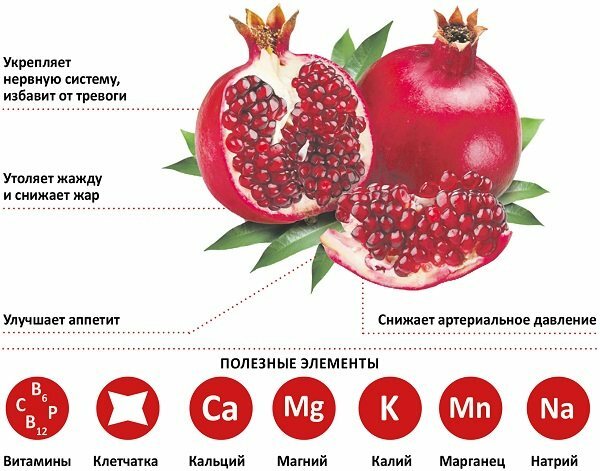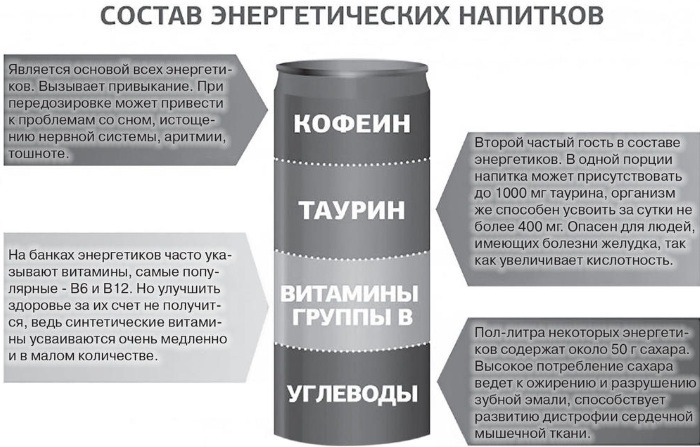Excess magnesium in the body - hypermagnesemia, which can develop against the background of taking medications and with the development of diseases. Symptoms can manifest in different ways in women and men. If you try to fix the problem yourself, you may develop magnesium deficiency - this is a condition in which the amount of magnesium in the blood is below normal. The medical name for this disease is hypomagnesemia.
Record content:
- 1 Causes
- 2 Diagnostics
- 3 When to see a doctor
- 4 Prophylaxis
-
5 Treatment methods
- 5.1 Medications
- 5.2 Traditional methods
- 5.3 Other methods
- 6 Possible complications
- 7 Magnesium video
Causes
Every organ in the body, especially the heart, muscles and kidneys, needs a mineral vitamin. Magnesium is essential for many bodily functions. This includes physical and chemical processes in the body that convert or use energy during metabolism. A magnesium overdose is an excess of magnesium in the body.
In the absence of kidney disease, the body naturally removes excess magnesium. Magnesium overdose, also called toxicity or hypermagnesemia, usually occurs when a component is consumed in large quantities in supplement form, tablet or liquid form.
Magnesium overdose is very rare in foods that contain naturally occurring foods, such as fruits and vegetables, nuts and whole grains.
The main reasons are:
- Magnesium is commonly found in over-the-counter medications. It is often used as a laxative, so diarrhea after taking a magnesium laxative can be a mild symptom of a magnesium overdose.
- Antacids also contain magnesium. A mild magnesium overdose is usually accompanied by temporary diarrhea and nausea.
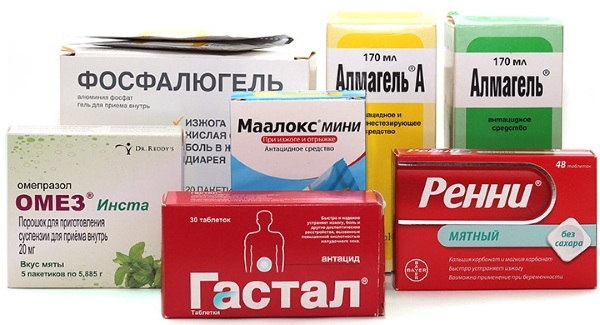
- People with impaired kidney function are at greatest risk of magnesium overdose. Even a mild overdose can cause a drop in blood pressure in people with kidney disease.
- Other possible serious symptoms include shortness of breath, muscle weakness, and confusion.
Below is a table of overdose symptoms:
| Manifestation | Symptoms |
| Mild overdose | Usually accompanied by temporary diarrhea and nausea. |
| Moderate or severe | Symptoms are associated with a drop in blood pressure, abdominal pain or cramps, bloating, or diarrhea. |
| Strong | Symptoms such as muscle weakness, nausea, which can be described as feeling lethargic, vomiting, and upset stomach are observed. |
Excess magnesium in the body (symptoms in women and men in the moderate stage appear alternately) in some cases can be life-threatening. The body naturally removes excess magnesium when the kidneys are functioning normally. It is very rare to experience a magnesium overdose when eating foods that contain naturally occurring magnesium.
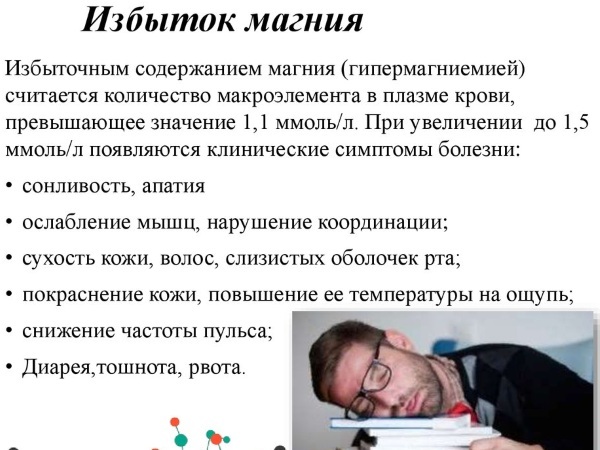
A number of factors increase the risk of developing an overdose, and these include:
- kidney disease;
- arrhythmia;
- violation of consciousness;
- disorientation.
Magnesium overdose usually occurs when magnesium is consumed in large amounts in supplement form.
Diagnostics
A blood test for magnesium measures how much magnesium is in the blood. Magnesium is a type of electrolyte.
Electrolytes are electrically charged minerals that are responsible for many important functions and processes in the body. The body needs magnesium for the muscles, nerves and heart to function properly. Magnesium also helps control blood pressure and blood sugar levels.
Most of the magnesium is found in bones and soft tissue cells. Serum magnesium is used for testing when donating blood.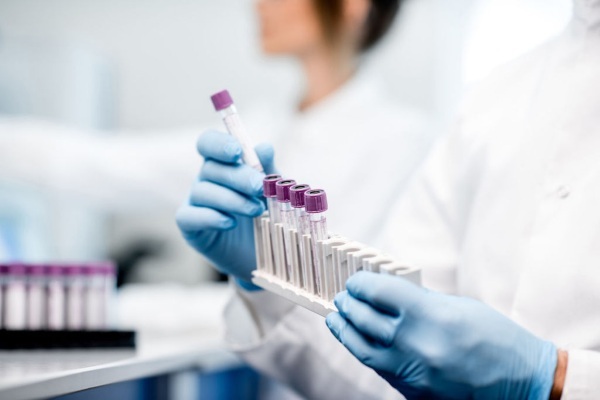
If the results show that the blood level is higher than normal, this could be a sign of:
- Addison's disease;
- adrenal gland disorders;
- kidney disease;
- dehydration;
- loss of large amounts of fluid;
- diabetic ketoacidosis (a life-threatening complication of diabetes).
Your doctor may recommend intravenous therapy, which can remove excess magnesium. Normal serum magnesium levels are 1.7 to 2.3 ml / dL for people aged 17 and over.
Another method for determining the level of magnesium in the blood is the method of colorimetry with xylidyl blue based on blood serum. It can be carried out in a polyclinic or a private laboratory for 350-400 rubles. The research result is available on the day the material is submitted. The essence of the method consists in staining reagents and identifying the level of magnesium by color.
The measurement should include three-color colorimetry obtained by spectrophotometric or colorimetric methods. Further consideration will be given to object-light interactions and how they affect not only measurement but and on the perception of the sample, since manipulation of physical parameters can affect the overall appearance and shade.
If higher values are confirmed, the results can be interpreted as follows:
- renal failure;
- iatrogenic hypermagnesemia;
- hypothyroidism;
- dehydration;

- adrenal insufficiency.
Additional studies may also be assigned:
- potassium (K +), sodium + and chlorides;
- ionized calcium ++;
- cortisol;
- creatinine;
- urea;
- parathyroid hormone (TSH, phosphorus, 25-OH vitamin D).
In medical practice, methods of visual diagnostic tests, tomography, radionuclide technology and ultrasound methods are used. If the plasma cations give a low value, a stress test (aqueous, magnesium tolerant, or oral) may be prescribed. Non-invasive testing involves taking 1/3 of the daily magnesium dose of Per Os for an outpatient follow-up study.
When to see a doctor
Excess magnesium in the body (a woman's symptoms may differ from that of a man's, but it is also important to consider age and lifestyle) should be treated only after visiting a doctor.
His help is needed when observing the following symptoms:
- pain in the abdomen, pelvic region, or lower back;
- balance problems;
- difficulty walking;
- chest pain or pressure;
- confusion or loss of consciousness;
- shortness of breath or rapid breathing;

- memory loss, tingling, or weakness in the limbs;
- irregular heartbeat (arrhythmia).
In such cases, the doctor is obliged to diagnose and test. With different indicators of deviations from the norm, it is necessary to consult an endocrinologist, nephrologist, cardiologist or other specialist.
Prophylaxis
In order to prevent excess magnesium, it is recommended to take drugs that remove excess minerals along with waste products. These drugs include organic salts, which neutralize most of the drugs containing magnesium (Magnerot).
For the withdrawal of orotic acid, it is necessary to stimulate the synthesis of nucleic acids in order to enhance the processes in regenerative tissues.
Substances act on the metabolism, also forming albumin in the liver. During normal kidney function, magnesium is excreted in 3-4 days. When pathology is detected (pyelonephritis), the properties of the I membrane-stabilizing channel, which blocks the calcium ducts, should be combined.
The concentration of magnesium in the cell depends on the amount of calcium, therefore, the primary measures may be those aimed at removing potassium and calcium.
Persons suffering from diabetes, ischemic disease, myocardium are advised to eat foods containing magnesium without taking additional vitamins.
Treatment methods
An excess of magnesium in the body, the symptoms of which in women and men can be absolutely identical, should be treated as an independent disease. This is necessary to prevent the development of complications in the form of a number of diseases. If found, it is impractical to treat individual cases of the disease if the magnesium level does not decrease.
There are 4 types of drugs that can be prescribed to eliminate excess substance:
| Medicines | Reception |
| 1st generation | Inorganic compounds - calcium oxide, magnesium sulfate in the form of salts should be taken on an outpatient basis during the course.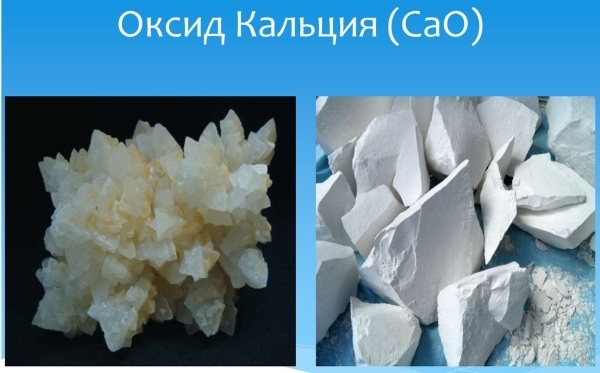
|
| 2nd generation | Organic compounds of proteins - lactate, citrate, pidolate and aspirginate can be taken after elimination of the symptoms of diseases that accompany excess magnesium. |
| III generation | Biological ligands of exogenous origin are able to neutralize natural and plant components of magnesium, leaving only the necessary magnesium cells in the body. |
| IV generation | Analogues of endogenous ligands, which are prescribed for the recombination of forms of magnesium. They contain neuropeptides, amino acids and enzymes that promote the breakdown of substance cells. |
The first group of drugs affects metabolism. Side effects include vomiting and metal taste in the mouth. The second group has antacid properties, therefore it is recommended for the correction of excess and deficiency of magnesium.
Another, 3rd group of substances, helps to normalize magnesium homeostasis. The latter absorbs citrate and aspartate in the gastrointestinal tract, removing all magnesium salts in 43% in 1-2 days.
Medications
Excess magnesium in the body can be recognized by testing. For a blood test, women should not eat anything in the morning. Men can donate blood on an empty stomach in the 1st half of the day.
Then, according to the observation of the symptoms and dynamics of the disease, additional examinations and a course of treatment can be prescribed:
- Substitution therapy - drugs are used to provide nutritional support to the work of the digestive tract. On support, magnesium lactate can be injected intravenously, which helps to identify the area of cellular damage. The cost of 1 pack. Is 482 rubles. For the full course, 2 packs are enough.
- Mineral citrates can be purchased for 487-811 rubles. per unit For a course of treatment of 2 weeks, 6 dosages are required for 7 days. The drug is intended for intravenous use. It cannot be used without a doctor's prescription, which is the dosage, since among the side effects there is a dyspeptic complication (abdominal cramps, pain, cramps and vomiting).
- Organic salts are best absorbed during normal kidney function. The cost of the drug is 3700-7800 per course of treatment. Injections must be carried out in the hospital mode in the form of droppers.
Traditional methods can be used as an alternative treatment.
Traditional methods
Proven alternative methods of treating excess magnesium include replacement therapy, which are designed to indirectly affect the removal of minerals from the body:
- It is necessary to completely exclude the intake of dietary supplements, vitamins containing magnesium.
- It is necessary to consume foods high in magnesium together with vitamins - chocolate, nuts, almonds, soy, buckwheat.
- Calcium cannot be absorbed without magnesium. With an excess of the first, you need to increase the dosage of the second. Thus, with an increase in metabolism at the cellular level, together with calcium and potassium (part of calcium complexes), the body will be cleared of excess substance faster.
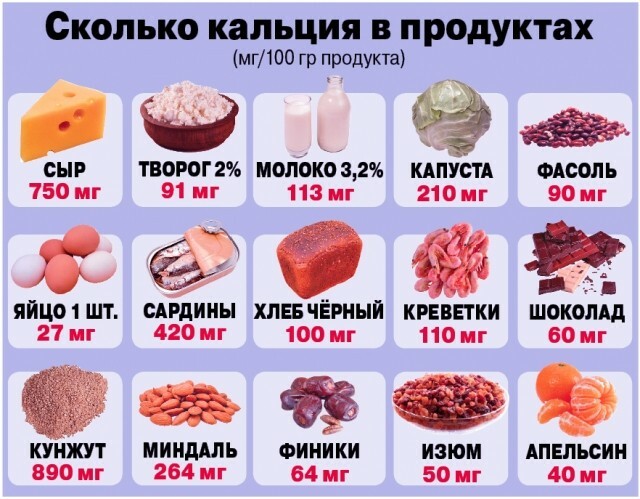
With an excess of magnesium in the body, you need to consume more calcium - It is necessary to exclude fatty foods that interfere with absorption and metabolism. The more organic substances in the blood and plasma that can remove magnesium, the better the body copes with its loss (before reaching the norm).
- It is necessary to exclude preparations and products containing phosphorus. Fish, as a source of amino acids, can cause magnesium retention in the blood. And with a lack of calcium, the substance will accumulate in the plasma, causing complications.
Also, due to the presence of excess magnesium, diseases can develop that require additional treatment.
Other methods
Among the effective methods for treating excess magnesium is the method of replacement therapy. It is based on the intake of individual subgroups of vitamin B (B6 or B1). The galenic forms of the substance help other components to be absorbed into the blood faster, neutralizing the effect of magnesium. They can be purchased in the form of 0.5 g tablets with a vitamin content of up to 27 mg.
Effervescent tablets contain 0.15 g of active substances, among which there are vitamins in the amount of 24.4 mg for the removal of magnesium from the body.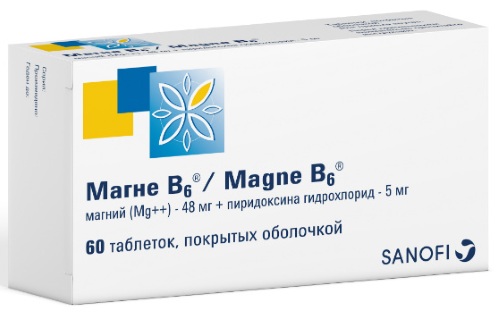
0.5 g tablets with a proportion of vitamins up to 32.7 mg help to restore a number of kidney functions and improve metabolism. In the same form, tablets containing 49.7-49.8 mg of calcium and potassium are able to eliminate the side effects of an overdose of the active ingredient.
Their cost ranges from 900 to 5700 rubles. for the course of treatment. The drug can be prescribed by an endocrinologist or gynecologist, who builds a course of treatment for a woman.
Possible complications
Excess magnesium in the body (symptoms in women, men and children may differ due to the body's need for a substance in different age) can lead to serious consequences and diseases that cannot be treated by eliminating the root cause (withdrawal of excess magnesium).
The equivalent concentration of magnesium for adults is 1.8-2.4 mg / dL (1.5-2.0 IU / L or 0.75-1.0 Mmol / L). As a treatment, the dosage can be increased to 2-3.5 Mmol / L or naturally lowered to normal. The toxic level of magnesium in blood plasma is 12 mg / dl, which is dangerous for the neuromuscular system.
Against the background of an increased level of magnesium content, diseases such as:
- Diarrhea and nausea are characteristic when the indicators reach 1.1 Mmol / l.
- Symptoms such as pathological apathy, drowsiness, vomiting and dehydration appear at 1.5 Mmol / L.
- At 2.5 Mmol / L, a person experiences arrhythmia.
- If the value reaches 5 Mmole / L and above, the work of the heart weakens, which can lead to death.
With a gradual increase in the concentration of magnesium, symptoms of oxygen starvation, heart and respiratory failure may develop. This is dangerous because the indicators can reach 7.5 Mmol / l values - the work of nerve and muscle reflexes is inhibited.
As a result, a person gets sick:
- glomerulonephritis;
- pyolonephritis;
- nephrosis;
- Barter and Gitelman syndrome;
- hypothyroidism;

- iatrogenic hypermagnesemia.
Also, excess magnesium can be caused by the presence of tumors in the body. In such cases, it is necessary to eliminate the root cause (oncology treatment). In other situations, it is necessary not only to normalize the level of the substance in the plasma, but also to undergo treatment for diseases caused by an excess of magnesium.
Hypothyroidism due to excess magnesium can lead to 2 diseases:
- primary - dysfunction in the thyroid gland;
- secondary - diseases of the hypothalamus and pituitary gland.
Persons over 50-60 years old are susceptible to these diseases. If symptoms appear at a young age, it is worth talking about hereditary factors.
This also includes Barter's syndrome - a defect in the renal tubules, which is caused by the production of potassium, sodium, magnesium and chlorides in large quantities. As a result of electrolyte imbalance, abnormalities in the development of growth, nerve endings and muscle activity occur.
For the treatment of renal failure, as a factor in metabolic disorders and complications caused by excess magnesium, drug therapy is prescribed in the form of hemodialysis and peritoneal dialysis.
For this, the doctor prescribes:
- Antihypertensive drugs - normalize blood pressure, eliminates hypertension due to antihypertensive therapy.
- Vitamin D - goes through the stages of activation in the liver and kidneys, which improves the absorption of primary minerals. In the activated form, the vitamin is absorbed faster, which is especially important for those who suffer from chronic diseases.
- Iron - a structural component of hemoglobin, which is found in normal erythrocytes. It carries oxygen, eliminating cell starvation caused by excess magnesium. The drug is administered intravenously during dialysis.
- Erythropoietin (EPO or EPO) is a hormone produced by the kidneys that can stimulate bone marrow function. The latter is also responsible for the production of healthy red blood cells.
- Phosphate binders (binders) help restore plasma magnesium levels after dialysis.
Depending on the symptoms and dynamics of the disease, it is necessary to undergo testing and donate blood serum for analysis. As a treatment for excess magnesium in the body in men and women, a therapy will be selected that can restore the salt balance at the cellular level. It is also necessary to undergo tests to identify the reasons for the increase in magnesium levels, as well as possible complications.
Magnesium video
Malysheva will tell you about magnesium:


